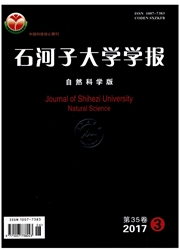

 中文摘要:
中文摘要:
为提高重组β-葡萄糖醛酸苷酶的底物特异性,通过易错PCR方法对其进行突变并构建突变体文库,利用薄层层析和高效液相色谱对突变文库进行筛选,获得了突变株PGUS(M51)E,其底物特异性提高了41%。突变酶的酶学特性研究发现,该突变酶的最适pH值和温度较PGUS-E无显著变化,酶活力下降了16.86%,T。值提高了5℃;序列分析结果表明:PGUS(M51)-E共发生5处突变,其中3处发生在糖基结合域。因此,利用定向进化策略能有效提高伊葡萄糖醛酸苷酶的底物识别特异性。
 英文摘要:
英文摘要:
To improve the substrate specificity of recombinant ~ glucuronidase, error prone PCR was performed to construct a mutant library. One mutant was selected by thin-layer chromatography and high performance liquid chromatography. The selected mutant was named PGUS(M51)-E, substrate specificity of which was improved by 41%. Enzymatic properties analysis showed that the optimum pH and temperature of the catalytic reaction were not changed obviously compared with wild type. The activity of PGUS(M51)-E was decreased by 16.86%, while the Tm value was increased by 5 ℃. Sequence analysis revealed that there were five mutations in the sequence of 13 glucuronidase, three of them located in the carbohydrate binding domain. Taken together, directed evolution could improve the substrate specificity of β-glucuronidase effectively.
 同期刊论文项目
同期刊论文项目
 同项目期刊论文
同项目期刊论文
 Effects of a Non-Conservative Sequence on the Properties of beta-glucuronidase from Aspergillus terr
Effects of a Non-Conservative Sequence on the Properties of beta-glucuronidase from Aspergillus terr An environment friendly and efficient process for xylitol bioconversion from enzymatic corncob hydro
An environment friendly and efficient process for xylitol bioconversion from enzymatic corncob hydro A new application of aptamer: One-step purification and immobilization of enzyme from cell lysates f
A new application of aptamer: One-step purification and immobilization of enzyme from cell lysates f Bifunctional Graphene/gamma-Fe2O3 Hybrid Aerogels with Double Nanocrystalline Networks for Enzyme Im
Bifunctional Graphene/gamma-Fe2O3 Hybrid Aerogels with Double Nanocrystalline Networks for Enzyme Im Direct and efficient xylitol production from xylan by Saccharomyces cerevisiae through transcription
Direct and efficient xylitol production from xylan by Saccharomyces cerevisiae through transcription Simultaneous in-situ excess sludge reduction and removal of organic carbon and nitrogen by a pilot-s
Simultaneous in-situ excess sludge reduction and removal of organic carbon and nitrogen by a pilot-s 期刊信息
期刊信息
